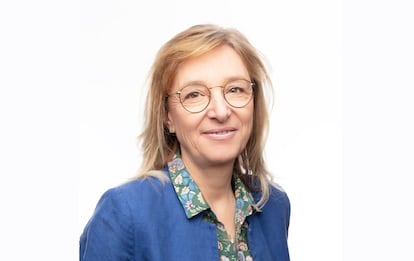Véronique Thouvenot, scientist: ‘Women’s empowerment depends on having good health’
The Chilean-French expert leads Zero Mothers Die, a cellphone application that provides information to combat maternal and neonatal mortality in countries facing extreme poverty


The World Health Organization (WHO) estimates that around 300,000 women die during pregnancy each year. “This means that over a 10-year period, we are facing three million deaths,” says scientist Véronique Thouvenot, 67, originally from Concepción, Chile. Thouvenot has dedicated her career to combating this global issue, which primarily impacts countries with extreme poverty. In 2012, the Chilean-French scientist spearheaded the development of the cellphone application Zero Mothers Die, which continues today to provide women, especially in Africa, with crucial information about pregnancy.
“It answers questions about what happens each week during pregnancy, as well as the development of the baby in its first months. It also alerts mothers to the signs they should watch for in case of complications and advises when to seek medical attention,” explains Thouvenot in a video call from Lyon. “The app offers simple advice, but it can save lives,” she adds about the initiative, which has also been implemented in some areas of Peru and Brazil.
Thouvenot’s concern for maternal and neonatal mortality traces back to her early years in Chile, where she spent the first 11 years of her life. During that time, she recalls a woman named Mercedes, her family’s domestic worker. With Mercedes, she visited some of the poorest neighborhoods of the Chilean capital in the 1960s.
“On her days off, my nanny would visit her friends who lived in the slums of Santiago. Many times, my parents and I would accompany her, bringing clothes, food, and hygiene products. I was a child, but I understood the conversations of the adults, and I remember them talking about a woman who had died during pregnancy. I also witnessed sick children suffering from polio who were dying at the time. All of this created an early awareness in my life,” says Thouvenot, who holds a degree in mathematics and is a public health specialist. She has also served as an advisor to the United Nations on health programs.
“The extreme poverty I saw as a child has always stayed with me, and it is exasperating that it still exists in the world,” she says. In countries where the Zero Mothers Die app is used — such as Ethiopia, Nigeria, and the Democratic Republic of Congo — the main factors contributing to the deaths of mothers and children are “infections, inadequate healthcare, poor prevention, lack of vaccines, discrimination, and violence,” Thouvenot explains. The scientist also points out that, in many of these regions, the death of pregnant women is viewed as something that “cannot be solved, but rather accepted.”
Thouvenot says that the majority of women seeking help through the app are very young. “Some are between 13 and 14. They have little education, no information, and don’t even understand what’s happening to their bodies because no one has talked to them about it. But even though they are extremely poor, with no access to clean water and very little electricity, they all have cell phones and are very tech-savvy,” she says. “Also, in these communities, women talk a lot. So, it’s crucial that just one of them has a phone and downloads Zero Mothers Die, so that 15 or 20 others can also benefit from the information.” She explains that once the app is downloaded, it can be used offline, and the information is available in nine dialects, tailored to local communities and their cultures.
Thouvenot says that the majority of the women who seek help through the app are very young: “Some of them are between 13 and 14 years old. They have no education, no information, they don’t even know what is happening to their bodies because no one has talked to them about it. But even though they are very poor, even though they don’t have clean water and very little electricity in their homes, they have a mobile phone and are very tech-savvy,” she says. “Also, in these communities, women talk a lot. So, it takes only one of them having a phone and downloading Zero Mothers Die for 15 or 20 others to also be informed.”
Thouvenot explains that once the app is downloaded, it can be used without an internet connection and that the information is available in nine dialects and adapted to the local communities and their culture.
Thouvenot emphasizes that the success of Zero Mothers Die has made her view technology as a powerful tool to address the world’s pressing health challenges. “It’s an ally in reaching patients more quickly, to reach areas where there are no healthcare professionals or that do not have access to clinics and hospitals,” she says, highlighting the potential of digital innovation to expand healthcare access.
Reflecting on her mission, she adds that ensuring “every human being in the world has access to quality healthcare is truly incredible because if you’re healthy, you can achieve so much in life, like studying and working.” She explains: “Without health, you can accomplish very little, especially when you live in places of extreme poverty. It is especially important for women, because women’s empowerment depends on having good health.”
Sign up for our weekly newsletter to get more English-language news coverage from EL PAÍS USA Edition
Tu suscripción se está usando en otro dispositivo
¿Quieres añadir otro usuario a tu suscripción?
Si continúas leyendo en este dispositivo, no se podrá leer en el otro.
FlechaTu suscripción se está usando en otro dispositivo y solo puedes acceder a EL PAÍS desde un dispositivo a la vez.
Si quieres compartir tu cuenta, cambia tu suscripción a la modalidad Premium, así podrás añadir otro usuario. Cada uno accederá con su propia cuenta de email, lo que os permitirá personalizar vuestra experiencia en EL PAÍS.
¿Tienes una suscripción de empresa? Accede aquí para contratar más cuentas.
En el caso de no saber quién está usando tu cuenta, te recomendamos cambiar tu contraseña aquí.
Si decides continuar compartiendo tu cuenta, este mensaje se mostrará en tu dispositivo y en el de la otra persona que está usando tu cuenta de forma indefinida, afectando a tu experiencia de lectura. Puedes consultar aquí los términos y condiciones de la suscripción digital.








































